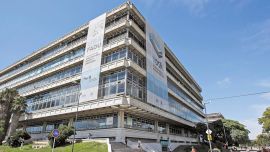Argentina’s poverty rate stood at 36.5 percent of the population in the first half of 2022, according to official data.
The figure, a drop of 0.8 percentage points compared to the second half of 2021, was revealed by the INDEC national statistics bureau based on a survey of 31 of the country’s largest urban populations.
Extreme poverty, meaning people who are unable to cover their basic food expenses, increased to 8.8 percent, some 5.3 million people, a drop of 1.9 points year-on-year but a rise of 0.6 points compared to last half-year.
In a devastating blow, INDEC revealed that more than half of those aged 14 and lower live in poverty, 50.9 percent, with 12.7 percent of the same group considered destitute.
The overall rate of 36.5 percent represents a drop of 4.1 points from 40.6 percent recorded in the first half of 2021 the preceding year, when the Covid-19 pandemic had paralysed economic activity. The number of people below the poverty line – i.e. those who do not cover the full basket of household expenses – in the survey was 10.64 million, of whom 2.56 million are destitute.
INDEC study is based on Argentina’s 31 largest urban areas and not on the entire population of 47 million people, but it offers an overall picture that can be projected to the whole country. Using the 36.5 percent rate, that would be equivalent to 17.3 million people.
Argentina’s economy grew 6.4 percent in the first half of the year, with unemployment at 6.9 percent in the second quarter. Income and wages, however, have been ravaged by runaway inflation. Between January and August prices rose 56.4 percent year-on-year, with annual forecasts now surpassing 90 percent.
Regional breakdown
INDEC’s figures show that 27.7 percent of the country's households are poor, with 6.8 percent in extreme poverty.
The worst situation was observed in Gran Resistencia, Chaco Province, where INDEC found that half of the population is poor. Concordia in Entre Ríos has 49.2 percent of its population not meeting their basic needs. In the country’s most populous region, Buenos Aires Province, 42 percent of inhabitants suffer from poverty.
Other cities where more than four out of every 10 were poor were Gran Catamarca (40.3 percent), Santiago del Estero (40 percent), Gran Córdoba (40 percent), San Nicolás (40.7 percent) and San Nicolás (40.7 percent).
The top place on the ranking went unsurprisingly to Buenos Aires City, where poverty reaches only 16.2 percent of the population. The second best rate was observed in Ushuaia (23.9 percent), followed by Formosa (24.4 percent).
According to official data, households living in poverty are made up of an average of almost four people each (3.96), with a family “basket” value costing 93,177 pesos for an income of 58,472 pesos. Thus, what poor families earn is some 40 percent below what is necessary to be out of poverty.
In the case of extreme poverty, close to four people per household was also detected (3.89), with an income of 26,000 pesos for a basic food basket that costs 40,857 pesos.
Fears and demands
INDEC’s next report could make for even more pessimistic reading, given the high inflation rates recorded in July, August and so far in September, which will damage purchasing-power even further.
Responding to the crisis, Argentina’s government recently announced new aid measures for the retired and underprivileged sectors to cope with rising prices.
Over the past week, social unrest has increased with demonstrators from the Unidad Piquetera social organisation blocking Buenos Aires’ main thoroughfare, Avenida 9 de Julio, with an encampment outside the Social Development Ministry. Protesters are demanding new aid and improved welfare packages, along with greater support for soup kitchens and community groups.
Taking to the social networks following the release of INDEC’s report, Vice-President Cristina Fernández de Kirchner called on the Economy Ministry to deliver a “more precise and effective intervention policy” for the food production sector to counteract inflation and prevent poverty.
– TIMES


























Comments